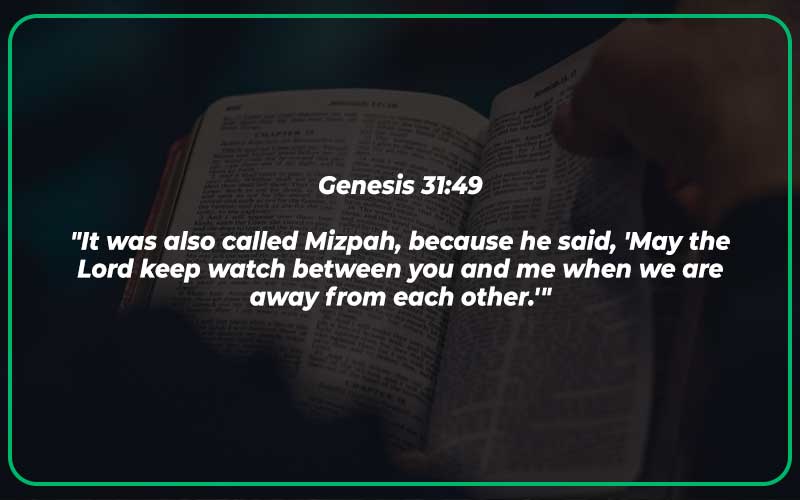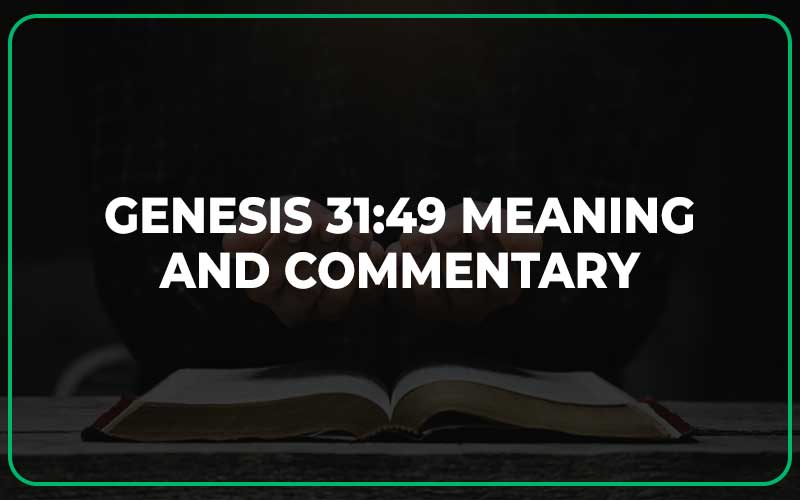Genesis 31:49
“It was also called Mizpah, because he said, ‘May the Lord keep watch between you and me when we are away from each other.'”
Genesis 31:49 Meaning
Genesis 31:49 is a verse in which Laban and Jacob make a covenant. It signifies a peaceful resolution and agreement between two parties. The verse illustrates the importance of maintaining good relationships and resolving conflicts in a peaceful and respectful manner.
Genesis 31:49 Commentary and Explanation
Genesis 31:49 is a significant verse that captures a pivotal moment in the biblical story of Jacob’s life. In this verse, Jacob and his father-in-law, Laban, have just made a covenant with each other, establishing a boundary marker as a witness to their agreement.
Firstly, the act of setting up a boundary marker or heap of stones serves as a physical and symbolic representation of the covenant between Jacob and Laban. This practice of setting up a memorial was not uncommon in the Bible, as it was a way to commemorate important agreements or events. For instance, in Genesis 28:18-22, Jacob set up a stone pillar as a memorial after God’s promise to him at Bethel. These markers served as a reminder of God’s involvement and as a witness to the covenant.
In Genesis 31:49, when Jacob and Laban establish this covenant, they name it “Mizpah,” which means “watchtower” or “watchpost.” The name is fitting because it symbolizes their commitment to watch over each other and hold each other accountable for their actions. This demonstrates the seriousness of the covenant they are making, as they invoke God as a witness, affirming their intentions to uphold their agreement.
Furthermore, the use of God as a witness in this covenant is significant and aligns with other biblical passages. In the book of Joshua, we see a similar practice when the Israelites enter into a covenant with the Gibeonites, where they invoke God as a witness (Joshua 9:15). This emphasizes the importance of making agreements with God as a witness, emphasizing the spiritual and moral dimension of the covenant.
In addition to the use of God as a witness, the Mizpah covenant highlights the theme of trust and reconciliation. Jacob and Laban had a history of conflict and deception, as seen in earlier chapters of Genesis. However, in Genesis 31, they come to an agreement that allows them to part ways amicably. This serves as a reminder of the importance of resolving conflicts and seeking reconciliation, as emphasized in Matthew 5:23-24, where Jesus teaches about the significance of making amends before offering gifts at the altar.
Ultimately, Genesis 31:49 and the establishment of the Mizpah covenant between Jacob and Laban remind us of the significance of covenants, the role of God as a witness, and the importance of reconciliation and trust. This verse encourages us to honor our agreements and seek peaceful resolutions in our relationships, all while recognizing God’s presence and guidance in our lives.
Also Read: Ezra 10:4 Meaning and Commentary
Context of Genesis 31:49
In Genesis 31, Laban chases after Jacob who has fled with his wives and children. Laban accuses Jacob of stealing his household gods, unaware that it was Rachel who took them.
Laban catches up with Jacob, and after searching for the stolen idols, Laban and Jacob decide to part ways. The verse in question takes place during this encounter, as Laban and Jacob make their covenant.

Breaking Down the Key Parts of Genesis 31:49
“The heap is a witness between you and me today.”: The stone heap served as a physical witness of the covenant between Laban and Jacob. It symbolized the agreement they made that day.
“Therefore, its name was called Galeed.” (verse 48): Galeed means “witness heap” in Hebrew. Naming the heap Galeed further solidified its purpose as a memorial and reminder of the covenant.
“Also Mizpah, for he said, ‘May the LORD watch between you and me when we are absent one from another.'”: Mizpah means “watchtower” in Hebrew. Jacob invoked the name Mizpah as a prayer to affirm that God would watch over them and ensure their covenant was upheld, even when they were physically separated.
Bible Study on Genesis 31:49
The practice of making covenants and erecting stone heaps is found throughout the Bible. An example of this is when Joshua made a covenant with the Israelites and set up a stone heap as a memorial (Joshua 24:26-27). These physical markers were not only reminders for the parties involved but also served as a testament to future generations.
In our own lives, we can learn from Laban and Jacob’s example. We should strive to resolve conflicts peacefully, seeking reconciliation and maintaining healthy relationships. Like Laban and Jacob, we can establish boundaries and agreements to prevent further disputes, remembering that God watches over us even when we are apart from one another.
Biblical Translations of Genesis 31:49
Genesis 31:49 King James Version (KJV)
“And Mizpah; for he said, The Lord watch between me and thee, when we are absent one from another.”
Genesis 31:49 New American Standard Bible (NASB)
“and Mizpah, for he said, ‘May the Lord watch between you and me when we are absent one from the other.'”
Genesis 31:49 English Standard Version (ESV)
“and Mizpah, for he said, ‘The Lord watch between you and me, when we are out of one another’s sight.'”
Genesis 31:49 New King James Version (NKJV)
“also Mizpah, because he said, ‘May the Lord watch between you and me when we are absent one from another.'”
Genesis 31:49 New Living Translation (NLT)
“It was also called Mizpah (which means ‘watchtower’), for Laban said, ‘May the Lord keep watch between us to make sure that we keep this covenant when we are out of each other’s sight.'”
Genesis 31:49 The Message (MSG)
“It was also called Mizpah (Watchtower), because Laban said, ‘God keep watch between us when we are out of each other’s sight.'”
Final Thoughts
Genesis 31:49 emphasizes the importance of resolving conflicts and maintaining peaceful relationships. Building a memorial, such as Laban and Jacob’s stone heap, symbolizes a commitment to peace and serves as a reminder of the covenant made.
As Christians, it is our responsibility to seek harmony in our relationships and to rely on God to watch over those connections. Let us remember to build bridges instead of walls, making every effort to resolve conflicts peacefully and maintain healthy relationships.

